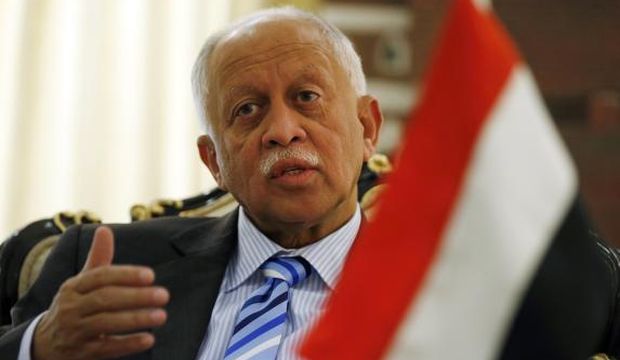
A picture taken on April 1, 2015 shows Yemen’s Foreign Minister Riyadh Yassin talking to the press at the Yemeni embassy in the Saudi capital Riyadh. (AFP Photo/Stringer)
Aden, Asharq Al-Awsat—The Yemeni government has not been informed of UN-brokered talks currently being held in the Omani capital Muscat in order to resolve the crisis in Yemen, Foreign Minister Riyadh Yassin said on Sunday.
UN Special Envoy to Yemen Ismail Ould Cheikh Ahmed, who has been shuttling between Muscat and Sana’a for months in a bid to find a solution to the crisis which has gripped Yemen for almost a year, said on Sunday he would be holding talks this week in Muscat over the crisis.
Yassin told Asharq Al-Awsat the government also does not know who will be participating in the talks with Ould Cheikh Ahmed, though the foreign minister said he suspected the participants would be the “same people the UN envoy usually meets in Yemen and Muscat”—in reference to the Houthi movement.
Ould Cheikh Ahmed has held several meetings with delegations from the group, which currently controls large parts of Yemen, both in Sana’a and in Muscat over the past months.
Yemen’s crisis began in September 2014 when militias belonging to the Iran-backed Houthis overran the Yemeni capital Sana’a. The group then launched a coup in February, deposing the government and internationally recognized President Abd Rabbuh Mansur Hadi.
The UN has called for a “political solution” to the crisis, but Yassin said the government could not enter into an agreement with the Houthis after the group has committed human rights violations in Yemen.
International NGOs including Human Rights Watch have accused the Houthis of targeting civilian areas using mortars, rockets, and other heavy weaponry. They have said Houthi leaders and commanders could face trial over human rights crimes committed in the country.
Yassin also called on the Houthis to abide by a UN resolution stipulating their withdrawal from areas under the group’s control and returning all weapons seized back to the government.
“There can be no political solution with such people [the Houthis], who have committed all this violence, murder, and slaughter in Yemen,” he said.
“When the [Houthis] abide by the UN resolution in full, and the legitimate [government] is back in charge of the whole of the country—without any exceptions—then we can start talking about a genuine political solution. One that is [feasible] and accepted by all Yemenis.”
Ambassador’s home
Meanwhile, allegations were made by the Omani government on Saturday that the Saudi-led coalition currently targeting the Houthis in Yemen and seeking to restore the Yemeni government had deliberately bombed the home of the Omani ambassador in Sana’a.
The coalition, which is conducting an air and ground campaign in Yemen, has denied its warplanes targeted the ambassador’s home, insisting it concentrates only on military targets. Speaking to Asharq Al-Awsat on Saturday, coalition spokesman Brig. Gen. Ahmed Asiri accused the Houthis of carrying out the attack and said the coalition welcomed an investigation into the incident.
Yassin meanwhile said he found it “highly unlikely” that the coalition would target the home of the ambassador.
“I assure you that what happened has been fully documented and I believe that the attack on the ambassador’s home . . . was a ground attack—meaning it was conducted by the Houthi militias using rockets. The Houthis time these attacks to coincide with coalition air raids, in order to create controversy in the media.”
